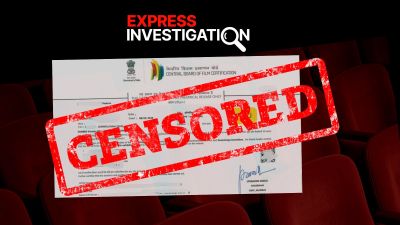We need stiff penalties for errant promoters
Arun Bajoria’s hostile bid may have fizzled away, but Nusli Wadia is still a worried man. Last week, the Bombay Dyeing ...

Arun Bajoria’s hostile bid may have fizzled away, but Nusli Wadia is still a worried man. Last week, the Bombay Dyeing chairman appeared before the Sebi’s takeover committee and made a strong pitch to protect industrialists from corporate predators. Wadia made the same points that Ratan Tata and Keshub Mahindra did when they met Securities and Exchange Board of India (Sebi) chairman D R Mehta a few week ago and had added a few of his own.
They are: First, that there should be no limits on creeping acquisition by incumbent management, so long as there is a lock-in period of one to three years. Secondly, all shareholders should be given an exit by forcing the acquirer to buy 51 per cent of the company. Thirdly, violation of the takeover code by acquirers should have stringent penalties and finally that the non-compete consideration paid to an acquirer in a friendly takeover should be factored into the open offer price in friendly takeovers.
Clearly, Mr Wadia appeared before the takeover committee only to lobby for himself and fellow industrialists who would ideally be eligible for membership to the anti-reform Bombay Club. With Ratan Tata having irretrievably blotted the Tata record with the sale of the ACC shares to Gujarat Ambuja, it was left to Mr Wadia to push the same outrageous demands which will benefit this management club. Instead of bothering with a detailed presentation, Mr Wadia could have simply reduced his demands to a single sentence ban all hostile takeover and allow incumbent management to deal with their shareholders and companies as they please.
Let us put into perspective the extraordinary panic among Mr Wadia and his friends. Statistics show that ever since the takeover code came into existence, there have been a 1000 friendly takeovers as against merely eight hostile bids. Of these hostile bids, only two were successful. Two failed, two others are being fought in court and two were withdrawn.
Even the two recent ones by Arun Bajoria and Abishek Dalmia on Bombay Dyeing and Gesco are dying out. The fact that only eight hostile bids were launched and just two succeeded is proof that the rules are completely skewed against hostile takeovers. This is bad for investors, since they remain at the mercy of incumbent management however badly it performs.
But let us analyse Mr Wadia’s demands. He wants unlimited creeping acquisition for all promoters, but neither he nor a majority of Indian promoters have even used the five per cent limit allowed to them under the law.
Secondly Mr Wadia wants the acquirer to buy at least 51 per cent of the equity through the open offer. This in a country where a majority of incumbent managements have controlled companies with less than 51 per cent and some as low as 10 per cent of the equity. As against this, an acquirer has to buy 20 per cent through an open offer, in addition to the 15 per cent initial acquisition which triggers the open offer requirement. Without the funds to buy a 35 per cent stake, he cannot bid.
Even then, the Gesco case shows that fellow industrialists close ranks to help incumbent management. Deepak Parekh, Chairman of HDFC and friend of the family, offers a line of credit and bring in a white knight. Even though the Sheth-Mulji families lose control the don’t mind so long as they get to choose who they share control with. The acquirer gets no such funding.
Let us also go back to the ACC example. The Tatas controlled ACC for decades with a 14.5 per cent holding and also walked away from the company by selling it at three times the ruling market price, leaving minority shareholders in the lurch and without so much as an explanation.
Clearly, the system gives a long rope to incumbent management. Yet, with ACC as a recent example, Nusli Wadia still demands that an acquirer should be forced to buy 51 per cent of the equity all because the jute trader Arun Bajoria gave him a fright.
Finally there is Mr Wadia’s argument about ‘factoring in’ the non-compete clause into open offers. What he really means is that he wants part of the price “factored outâ€. This means that incumbent management should be allowed a higher price as non-compete payment and that ought to be “factored out†of the open offer price to minority investors. This is aimed at redeeming the Tata action in ACC.
Were such a clause factored into the takeover code and the ACC deal were to happen again, the Tatas could justify walking away with thrice the market price under the guise of a non-compete clause. Surely any investors can see through Mr Wadia’s motivations and how anti-investor are his demands.
Someone ought to remind Mr Wadia and other industrialists that there is nothing to stop them running their companies as private ones and to keep the entire equity for themselves. They approach investors through a public issue because they want their and begin to refer to the company as “your company†at Annual General Meetings.
This makes minority investors co-owners of the company and gives them several rights. This includes the right to information, the right to the same exit price as incumbent management and the right to throw out management and to support a hostile bid if they fail to perform efficiently.
If Mr Wadia and his club tries to distort these rights by lobbying for patently unfair conditions to the takeover code, it will in the long run drive investors away and kill the capital market.
In fact, the only point on which one is in complete agreement with Mr Wadia is his demand for stringent penalties. Such penalties should apply, not only to violations of the takeover code, but also when existing management enriches itself through asset stripping and diversion of funds (a point that was made by Abishek Dalmia, who launched the hostile bid against Gesco to the takeover committee). The biggest industrial houses are guilty of diversion of funds and asset stripping and killing companies through relentless pillage. Yet, they get away scot-free and continue float new projects and raise fresh funds from banks, institutions and the market.
Does Mr Wadia advocate stringent penalties for these too? In recent times, the Chennai High Court has rapped the A C Muthiah group company MCC Finance Ltd. for financial irregularities and asset stripping leading to 50,000 depositors losing their money. Does Mr.Muthiah suffer any embarrassment.
Not at all. Instead, in another avatar as the head he is hogging the headlines and presiding over the punishment of cricketers involved in the betting scandal. Yes, Mr Wadia we need stringent penalties.
Author’s email: suchetadalal@yahoo.com



- 01
- 02
- 03
- 04
- 05




























